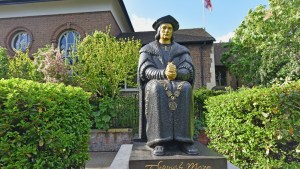Lenten Campaign 2025
This content is free of charge, as are all our articles.
Support us with a donation that is tax-deductible and enable us to continue to reach millions of readers.
During his lifetime, St. Thomas More achieved international esteem as a writer and government official. His position as Lord Chancellor for King Henry VIII kept him away from his family for long periods of time while he worked in London and traveling abroad. His time was much in demand during this period of life and the King greatly relied on his expertise in running a government. Later, after the King had broken from the Catholic Church and demanded his government officials compromise their faith by denying the supremacy of the Holy Father, More fell out of favor. Alone out of all the highly placed officials, he declined to deny his faith.
More was arrested and sent to the Tower of London where he languished for many months and, eventually, was put on trial, convicted, and martyred. For his courage, More is rightly admired and has been made a saint of the Church.
The saint who made time for his family
Lesser known but equally admirable was his commitment to his wife and children during his life. His diligence as a father was, in its own way, an example of heroic virtue. At the very least, it provides an example that all of us today can benefit from. In the midst of a busy life, he always made time for family.
At age 26 he married Jane, with whom he had four children before her early death. He remarried a widow named Alice, with whom he adopted four orphans to add to their already bustling family. In-laws came to make extended stays, long-term guests were always welcome, and they even acquired a beloved pet monkey.
Suffice it to say, the More household was lively. How did St. Thomas More, as busy and important as he was, manage to give his family the time they deserved? How is it that his family loved him to the very end, not simply because he had accomplished so much in the public sphere but because he was their beloved father?
Prayer
First, he kept the household well-ordered by structuring each day around morning and evening prayers. The family always prayed together, and More would read Scripture aloud during dinner. He himself often attended Holy Mass early in the morning before anyone else was awake. In a large, bustling family, he could have let everything slide into chaos, especially since he had to travel for long periods of time, but instead he took his duties as a father seriously and assisted his family to develop strong spiritual devotion and an orderly use of time.
This is such a precious gift, for children to be made aware that God exists and loves them very much. This is the knowledge that allowed his children to grow up with strong virtue and sense of self. His eldest daughter Margaret, for instance, went on to become known as one of the most learned women of her time period.
Family time
Second, even though he was a busy man, St. Thomas More never compromised on spending time with his children. When he was home, the family ate dinner together even when he was hosting distinguished guests, he spent long hours assisting with their education and personally attending to their intellectual development, and when they had the opportunity for leisure, he often spent it with the family in the garden.
When he was away from home, he wrote letters home almost daily. He was always thinking of his children and would send them poems he’d written for them along with other details of his day. He encouraged the children to write to him in return. More didn’t need the letters to be about anything special. He simply wanted to hear from them.
In one letter, More writes, “I cannot adequately express, my delightful daughters, how greatly pleased I am by your charming letters. For believe me truly there is nothing which refreshes me so much in the midst of this bothersome business as reading what comes from you. And so, I long with all my heart to hasten home.” His family was in no doubt that he valued them greatly and wanted to share in the entirety of their lives.
Love
Finally, in person and in his letters, More didn’t shy away from clear expressions of love. He complimented and encouraged his children, proclaiming how overjoyed he was to be able to communicate with them. In one letter, he jokes that he wouldn’t accept any excuses for not hearing from them; “How can you possibly lack something to say when I am glad to hear about your studies and your games.” In one letter to Margaret, he reminds her how soft-hearted he was with his daughters; “You know how often I have kissed, how rarely spanked you, and then only with a peacock’s tail…”
In return, his children loved him dearly. Margaret famously pushed her way to him through a potentially violent crowd as he was being paraded through the streets outside the Tower of London as an enemy of the state. She threw her arms around him and held on tightly until he finally convinced her to let him go. One of his very last letters before his death was to her, and in it he declares, “’I never liked your manner toward me better than when you kissed me last, for I love when daughterly love and dear charity hath no leisure to look to worldly courtesy.” To the end, St. Thomas More was complimenting his daughter and declaring how much he loved her.
Finally, he asked her to pray for him when was gone. I like to think that she did, every single day, and that he prayed for her, and all his family, and even now they’re together again in Heaven.



